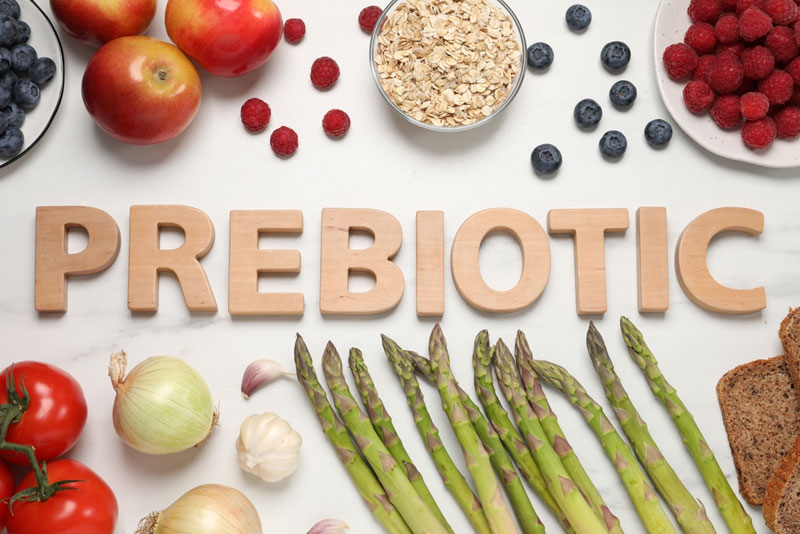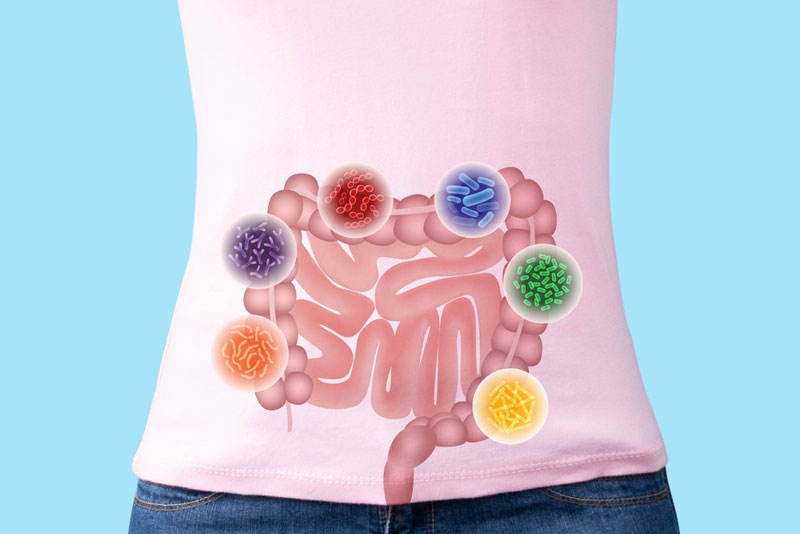Have you ever wondered how to supercharge your gut health naturally? Dive into the world of prebiotic foods. These powerful nutrients act as the growth medium for the beneficial bacteria in your body, revolutionising your health from within. In this complete guide, you’ll discover why prebiotics are essential, the top prebiotic-rich foods, and how integrating them into your daily regimen can significantly boost your overall wellness. Get ready to transform your gut health and live an optimally balanced lifestyle with the incredible power of prebiotics!
Several foods are rich in prebiotics, including almonds, bananas (especially firm ones), whole grain wheat, whole grain corn, whole grain rye and barley, flax, soy, cabbage, raw garlic and onion, jicama, peas, eggplant, artichoke, asparagus, oats, and raw leafy greens. These foods can provide the necessary nutrients to support the growth and activity of beneficial bacteria in the gut.
Understanding Prebiotics

Before we dive into the world of prebiotic foods, let’s first understand what prebiotics are. Prebiotics are fibre in certain plant-based foods that stimulate beneficial bacteria in the gut, promoting overall well-being. They nourish these good bacteria, allowing them to thrive and carry out their important functions in our digestive system. Think of prebiotics as the fuel that helps sustain a healthy gut microbiome, which is essential for physical and mental health.
Prebiotics work hand in hand with probiotics, which are live bacteria that provide numerous health benefits when consumed. While probiotics introduce good bacteria into our gut, prebiotics act as their food source, helping them flourish and maintain a balanced ecosystem in our digestive system. Together, they contribute to a healthier gut and stronger immune system.
Food Sources of Prebiotics
Now that we understand prebiotics and their role, let’s explore the variety of food sources that contain these beneficial fibres. Fruit and vegetables are excellent sources of prebiotics, as they typically have high amounts of dietary fibre necessary for gut health. Some of the top prebiotic-rich foods include dandelion greens, Jerusalem artichoke, garlic, leeks, onions (including creamed onions), cowpeas, asparagus, and Kelloggs All-Bran cereal.
Onions and related foods stand out because they contain multiple forms of prebiotics, resulting in a larger total prebiotic content. Approximately half a small onion (4 ounces) provides about 5 grams of prebiotics.
Plant proteins containing a specific carbohydrate attached to plant proteins also serve as a prebiotic food source for gut bacteria. However, it is worth noting that foods with little prebiotic content are animal products such as dairy products, eggs, and meats.
The abundance of prebiotics in these plant-based foods highlights the importance of incorporating a variety of fruits, vegetables, and whole grains into our diet for a healthy gut microbiome. These foods provide essential nutrients and nourish the beneficial bacteria in our gut, fostering overall well-being.
Plant-Based Foods Packed with Prebiotics

When boosting your gut health, incorporating prebiotic-rich foods into your diet is an excellent place to start. These plant-based foods contain non-digestible carbohydrates that fuel the beneficial bacteria in your gut, promoting their growth and enhancing your digestive system functionality. Some of the top prebiotic foods include:
- Chicory Root: This root vegetable is known for its high inulin content, making it one of the richest sources of prebiotics.
- Garlic: Besides adding flavor to dishes, garlic contains fructans, a prebiotic fiber.
- Onions: Like garlic, onions are rich in fructans and can significantly boost your prebiotic intake.
- Asparagus: Not only is asparagus a delicious vegetable, but it’s also high in inulin and can support the growth of beneficial gut bacteria.
- Bananas: The resistant starch in unripe bananas acts as a prebiotic by feeding healthy gut bacteria.
By incorporating these prebiotic-rich foods into your daily meals, you can support a healthy balance of gut bacteria and improve your overall digestive wellness.
Supplements to Boost Prebiotic Intake

While consuming the right foods is key, obtaining sufficient prebiotics through diet may be challenging. In such cases, supplements can be a convenient way to boost your prebiotic intake. Here are some popular options worth considering:
- YourBiology SuperGreens: Packed 17 ingredients, including prebiotic inulin, probiotics with Lactobacillus strains, antioxidants, and various greens.
- Athletic Greens AG1: Provides essential micronutrients and supports gut health, focus, energy levels, healthy aging, and immune health.
- Laird Superfood Daily Greens: A blend of 22 superfood ingredients that support a healthy gut and provide optimal daily nutrition.
- Seed DS-01 Daily Synbiotic: Addresses intestinal microbiota harmonization and offers better digestion, immune response, and overall vitality.
- LiveItUp Super Greens: An all-natural greens powder that enhances digestion, immune system, and energy levels.
When choosing a prebiotic supplement, consider factors such as clean and science-backed ingredients, natural sources with no additives, adequate serving size and price, provider reputation, customer reviews and ratings, safety certifications (GMP-certified, USDA organic), and third-party testing. Remember that supplements should complement a healthy diet rather than replace it entirely.
- According to a 2015 study published by the British Journal of Nutrition, about 5-15% of the total dietary fiber intake in the Western diet comprises prebiotic fiber, mostly from wheat and onions.
- Research has shown that daily 5 grams of prebiotic fiber can significantly improve gut health and digestion.
- According to USDA guidelines, foods like bananas, asparagus, and whole grains that are rich in prebiotics make up approximately 70% of the necessary daily fiber intake.
Health Benefits of Prebiotics

Did you know that prebiotics offer benefits equally as important as probiotics benefits? Yes, that’s right. Prebiotics are essential for maintaining the health and balance of the gut microbiome. So, just like probiotics, prebiotics are a must-have for a happy and healthy gut.
There are some crucial health benefits of taking prebiotics, which are given below:
The Role of Prebiotics in Gut Health
Prebiotics are a type of dietary fibre that nourish the beneficial bacteria in our gut. While they may not receive as much attention as their microbial counterparts, probiotics and prebiotics play a vital role in maintaining a healthy gut microbiota. Prebiotics offer a range of health benefits by supporting the growth and activity of these good bacteria.
Enhancing Digestive Health with Prebiotics
One significant advantage of incorporating prebiotic foods into your diet is their ability to promote digestive health. When the beneficial bacteria in our gut ferment undigested prebiotic fibers, they produce short-chain fatty acids (SCFAs), such as butyrate. These SCFAs fuel the cells lining our colon, helping maintain a healthy intestinal barrier and improve overall digestion. This can lead to a reduction in common digestive issues like bloating, constipation, and diarrhea.
Boosting Nutrient Absorption through Prebiotics
Moreover, prebiotics also contribute to better nutrient absorption. The fermentation process of prebiotic fibers produces compounds that can enhance mineral absorption, particularly calcium and magnesium. This is especially beneficial for individuals at risk of osteoporosis or those seeking to maintain strong bones and teeth.
Prebiotic foods offer various benefits, from supporting overall digestive health to improving nutrient absorption.
Digestive Benefits and Nutrient Absorption
Prebiotic foods help create an environment in the gut favorable for the growth of beneficial bacteria, thus promoting optimal digestion. These bacteria ferment prebiotic foods, producing important byproducts like SCFAs that provide energy for colon cells and contribute to a healthier gut environment. By improving gut motility and regulating bowel movements, prebiotics can alleviate symptoms of gastrointestinal discomfort and promote regularity.
Strengthening Bone Health via Improved Mineral Absorption
In addition to enhancing digestion, prebiotic fibers also play a crucial role in nutrient absorption. The fermentation process produces SCFAs and increases the bioavailability of certain minerals like calcium and magnesium. These minerals are essential for maintaining strong bones and teeth, and by improving their absorption, prebiotics contribute to overall skeletal health.
Potential Side Effects of Prebiotics

While prebiotics offer numerous benefits to your gut health, it’s essential to be aware of potential side effects that may arise. Although generally well-tolerated, some individuals may experience digestive discomfort when consuming prebiotic foods. This can include symptoms such as bloating, gas, diarrhea, or abdominal pain.
Personalizing Your Prebiotic Intake
These effects are more common in individuals with a sensitive digestive system or who simultaneously consume large amounts of prebiotic-rich foods.
It’s worth noting that these side effects are typically temporary and fade as your body adjusts to the increased intake of prebiotics. Starting with small amounts and gradually increasing consumption can minimise any discomfort. It’s also important to remember that everyone’s response to prebiotics is different, and what may cause discomfort for one person may not affect another.
If you find yourself experiencing persistent or severe digestive symptoms after consuming prebiotics, it’s advisable to consult with a healthcare professional. They can help determine whether the symptoms are related to prebiotic consumption or if there might be an underlying condition causing the discomfort.
Addressing Specific Health Conditions and Prebiotic Tolerance
Furthermore, individuals who have specific gastrointestinal disorders, such as irritable bowel syndrome (IBS), may find that certain types of prebiotic fibers exacerbate their symptoms. In such cases, it’s recommended to consult with a registered dietitian or gastroenterologist who can provide personalized guidance on suitable prebiotics for your condition.
Identifying Allergies and Intolerances Related to Prebiotics
In rare cases, some individuals may have allergies or intolerances to certain prebiotic foods. For example, those with a fructose malabsorption issue may experience gastrointestinal distress when consuming foods high in fructans, such as onions and garlic. Suppose you suspect you have an allergy or intolerance to specific prebiotic foods. In that case, it’s best to eliminate them from your diet and work with a healthcare professional to identify potential triggers.
Understanding the potential side effects of prebiotics is similar to being aware of possible reactions to medication. Just as some people may experience side effects from certain drugs, the same can occur with prebiotic consumption. It’s crucial to pay attention to your body’s response and make adjustments accordingly.
Conclusion
In conclusion, while prebiotics have the potential to enhance gut health significantly, it’s important to be mindful of potential side effects that may arise, particularly if you have a sensitive digestive system or specific gastrointestinal disorders. By starting with small amounts and gradually increasing intake, consulting with healthcare professionals when needed, and paying attention to individual responses, you can optimize your gut health journey while minimizing discomfort.
